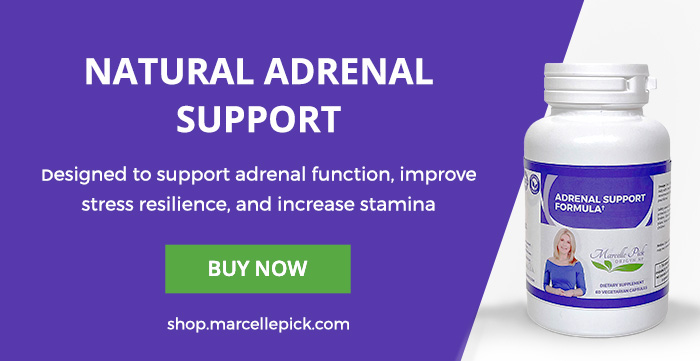Update 01/29/2023
“I feel like I’m walking through my life in a perpetual fog,” Kerry told me. She’d come to see me after experiencing a host of symptoms her doctor couldn’t explain, including having an “I just woke up” groggy feeling all day long. No matter how much she slept at night, she said, she never felt truly rested.
While we’ve probably all experienced “sleep inertia” (what most of us call grogginess) upon waking in the morning from time to time, what she was describing is a sign of a deeper problem. A few moments of unclear thinking on occasion is frustrating, but manageable. But an inability to focus clearly all day, every day, can lead to extreme frustration and anxiety.
And of course, that anxiety is likely to make the problem worse! This kind of constant grogginess can be due to dysfunction in the adrenal glands and imbalanced hormone levels, particularly cortisol. Stress increases demand for cortisol, and anxiety is certainly stressful. If you’re feeling, like Kerry, that nothing you do helps you feel alert and awake, you could very well be in the late stages of adrenal fatigue, where extreme hormonal imbalances have occurred.
Let’s take a quick look at adrenal fatigue and its various stages, then I’ll show you how you can support your adrenal glands to combat perpetual grogginess naturally.
What is Adrenal Fatigue?
Honestly, this term, which was coined by naturopath James Wilson, PhD in 1998, is a bit of a misnomer. I far prefer the term adrenal dysfunction, which gets to the heart of what’s actually happening.
But regardless of what you call it, the condition is real. Here’s a quick primer.
Your adrenal glands, which sit atop your kidneys, are responsible for producing a number of crucial hormones. When things are going well, your adrenals help these hormones stay balanced. But when something goes awry, you may have too much or too little of these essential hormones circulating in your blood. And that can lead to a wide range of uncomfortable symptoms (like grogginess).
Your adrenal glands have one primary responsibility above all: to help your body respond to stress so you can survive. Hormones like adrenaline and cortisol prepare your body for action when stressful situations arise.
Cortisol, the main “stress hormone”, turns nutrients from food into energy, regulates cardiovascular function and blood pressure, decreases inflammation, and modulates your immune response, as well as activating the “fight, flight, or freeze” stress response.
While this response is extremely important in the face of a real threat (think wild animals chasing our ancestors), it’s not very useful when we’re stuck in traffic. Unfortunately, your body can’t distinguish the difference. And the constant response to stress, big or small, means other important body functions have to wait.
Putting these other functions, like digestion, on hold temporarily isn’t a problem. But if your body never gets the message that it’s okay to relax the stress response and resume healthy digestion, that IS a problem.
When your adrenals produce cortisol indefinitely, high levels of this hormone can lead to imbalances in other crucial hormones, such as insulin, which regulates blood sugar. Not only that, but after a while, the constant call for cortisol becomes too much for the adrenal glands, and production falls off, which can lead to too little cortisol, which is also a problem. In fact, it’s this “exhaustion” of the adrenals that leads to the constant exhaustion you may feel.
Stress is by far the biggest factor in keeping things balanced where the adrenals are concerned. But, as illustrated above, stress isn’t always immediately obvious! Little stressors pop up all day long, and your body handles it all the same. That’s why learning how to recognize when your stress response has been activated and calm yourself down is a critical skill for good health.
Recognizing the early stages of adrenal dysfunction
Luckily, if we are in tune with our bodies, we can notice the little clues that something isn’t right before we reach the final stage of exhaustion. You just have to know what to look for! Your body passes through many stages of adrenal fatigue before reaching the absolute breaking point.
When you catch adrenal dysfunction early, you can avoid a lot of discomfort, and it will take far less time to get back on track. Sadly, many conventional medicine practitioners won’t pay attention to adrenal function unless it reaches a disease state. Working with an experienced functional medicine practitioner can help you identify which stage you’re in and what you can do to address it.
Although there’s no one consensus on how many stages there are, the progression is the same regardless of how finely you break it down. I typically break it into four stages – enough to notice when things are getting worse without perseverating about every tiny detail.
The stages I talk about are: the stress response, constant alarm mode, the resistance phase and burnout. It’s those last two that typically result in the constant exhausted, groggy feeling Kerry was experiencing.
The value in knowing these stages is that when you recognize what’s happening quickly enough and make some key adjustments to diet and lifestyle, you won’t hit those final stages. That doesn’t mean all hope is lost if you’ve reached stage four. It just means it will take longer and require more work.
Natural Ways to Support Adrenal Function
Regardless of what stage of adrenal fatigue you may be in, there are real things you can do to support a healthy stress response and adrenal function. Here are a few of the most effective strategies I use in my clinic.
Herbal support
One of the most exciting revelations about restoring energy naturally is the effectiveness of phytotherapy, or using plants medicinally. This isn’t a new concept by any means. People have been using plants for healing purposes for thousands of years. But evidence-based research now exists to back up phytotherapy as a legitimate treatment protocol.
Eleuthero, or Siberian Ginseng, has been researched extensively and found to contain properties that support the adrenal glands by fighting fatigue and stress. It boosts the immune system, helps reduce inflammation, and helps keep the mind clear. And those are only a few of the benefits research has shown Eleuthero can offer.
Herbs can be used in tea, tinctures, oils, creams and supplement pills. It’s important to work with a qualified practitioner, since some herbs are poisonous or interact adversely with prescription drugs. Some other herbs that can be useful in supporting the adrenal glands include:
- Astragalus root (A. membranaceus). This herb helps your body respond to stress, boosts immune function, regulates blood sugar and helps combat insulin resistance.
- Cordyceps (C. sinensis). This antioxidant supports immune function, stabilizes blood sugar, reduces inflammation and can slow the aging process.
- Rhodiola rosea (“golden root”). This adaptogenic herb can prevent stress-related fatigue and ultimate“burnout,” increase mental clarity, support immune function and blood sugar regulation, and reduce depression and anxiety.
- Licorice root (Glycyrrhiza glabra). Licorice Root, while well known for helping support adrenal balance, energy levels and endurance, must be used carefully. Some forms of licorice are known to increase blood pressure and lower potassium levels in the body, so pay close attention to your blood pressure if using licorice root.
- Ashwagandha. Ashwagandha is an ancient herb also known as an adaptogen, meaning it can help the body deal with stress. It also provides benefits to the body by helping boost brain function, lowering cortisol levels and it can help fight symptoms of anxiety and depression.
Appropriate exercise
Exercise is an important way to keep your body healthy and strong, but when your adrenals are already overtaxed, it’s important to pay attention to how you are exercising. Now is not the time to join a vigorous cardio boot camp or try rock climbing for the first time. If you have a routine that works for you already, you don’t have to change anything. But if you’re finding yourself unable to keep up, or haven’t been exercising at all, start slowly – maybe with a brisk walk outdoors. Gentle stretching, yoga, or any other exercise that feels restorative, not draining, are also good options.
Your food is medicine
Instead of prescriptions, try fresh fruits and vegetables and pay attention not only to what you eat, but when you eat it. Specific foods at specific times of day can help normalize cortisol levels. Going too long without food is a stressor, so be sure to feed your body at regular intervals. I have many articles on the best ways to support your adrenals with food. It’s important to remember that caffeine and sugar are temporary fixes that often cause more problems in the long run. They’re best avoided whenever possible.
Sometimes, food can’t give us everything we need, especially when adrenal dysfunction is in the late stages. High quality supplements intended to lend a hand to stressed adrenal glands can help your healing begin.
Address stress
Reducing stress levels is the single most important thing you can do to support your adrenals. You won’t be able to avoid all stress; in fact, you shouldn’t even try. Some stress is absolutely useful to survival. It’s the chronic, underlying stress that needs to go. Allowing yourself to quiet your mind, perhaps with meditation or deep breathing, will help immensely. Be sure to schedule time for yourself into your day and treat it as importantly as any other appointment you make.
Find time to do things that bring you joy, and don’t forget the value of play. It’s not just for kids! Play is what restores our energy, both mental and physical. This can look like whatever you want — board games, puzzles, sports, family time – anything that allows you to be fully present and enjoy the moment you’re in.
Practice gratitude
Any and all mindfulness and meditation techniques can help with adrenal function, but having a gratitude practice may be especially impactful. Research increasingly supports the power of gratitude, and recently I’ve been hearing some incredible true stories from patients and colleagues about how simply taking time to be actively grateful has led to healing from serious chronic illnesses.
Sleep is essential
One of the biggest underlying sources of stress is sleep deprivation. Be sure to allow for at least seven hours of sleep every night; eight is even better! Find a restful bedtime routine that allows you to wind down and successfully get to sleep. That means turning off electronics, putting away work, and relaxing your mind at least a half hour before bedtime. If you find yourself battling exhaustion during the day, give yourself permission to sneak off for a quick nap!
Tackle grogginess with these easy tips
As you begin to support your adrenal glands, the groggy feelings will slowly fade. You will reach a point where every action you take doesn’t require maximum effort. But it can take time to get to that place, and while you are waiting, these simple tips can help you clear your head, at least temporarily, so you can get started on (or continue on with) your day.
Open the windows
Getting outside to get some fresh air is best, but if you have to be inside and you find yourself unable to focus, opening some windows is the next best thing. It’s even better if it’s a sunny day and you can soak up some vitamin D at the same time.
Stay away from snooze
If grogginess in the morning is a problem, hitting the snooze button doesn’t help. That initial groggy feeling comes from waking out of a deep sleep. If you have to do that more than once, it can really start your day off on the wrong foot.
Make breakfast count
Speaking of starting the day right, it’s time to rethink what you’re having for breakfast. Cereal, pancakes, or other carb-heavy typical “breakfast foods” could be contributing to daytime grogginess. You might try intermittent fasting and skip breakfast altogether, but if you do eat breakfast be sure it includes some protein and healthy fats.
Wake up with water
Water can help in more ways than one. Drinking a glass of water when you first wake up replenishes fluids lost while you sleep and can help get you ready to face the day. A quick splash of cold water on your face helps stimulate the nerves in your face so you can wake up. Both of these tips can help at any time of day – not only when you get up in the morning!
You can regain your health with adrenal support
Kerry was so relieved that I didn’t look at her like she was crazy when she told me about her chronic grogginess and mental fog. She listened closely to what I had to say, and began taking steps to support her adrenal glands immediately. Several weeks later, she walked into my office positively glowing! She felt like she was finally back at the top of her game. When you understand and support adrenal function, you can be too!








